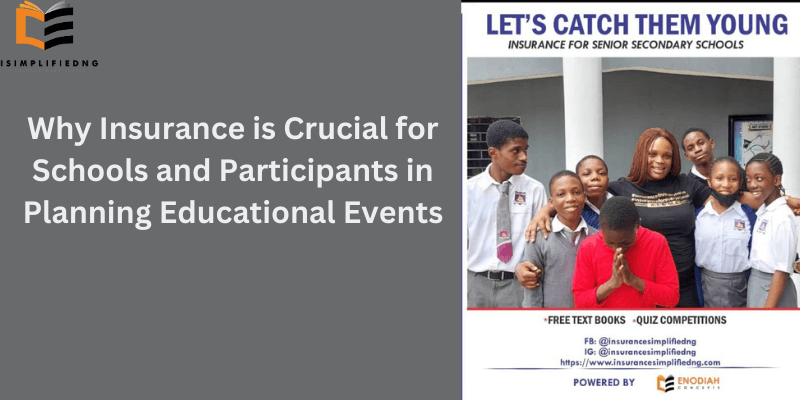
Educational events are a big part of school life in Nigeria and worldwide. Many people come together from sports competitions to academic conferences to learn, compete, and interact. These events bring great experiences, but they also come with risks.
One major risk is the possibility of medical emergencies, which can happen to anyone, at any time. This is why having the right insurance for educational events is very important. Therefore, we will explain why insurance in education is crucial, what types of insurance are available, and how schools, universities, and event organisers can benefit from having proper insurance coverage.
What is Insurance in Education?
Insurance in education simply means having protection in case something unexpected happens during a school event. These events can include sports days, study tours, conferences, and even everyday school activities. The goal of insurance is to make sure that if an accident, illness, or any other emergency occurs, there is a plan in place to cover the costs, reduce risks, and provide the right support.
Let us take for example, a situation where a student falls ill during a school sports event. Having insurance in place helps to cover the costs of medical treatment, hospital bills, or even transport to a hospital. In more serious cases, such as when a participant in an international event needs to return to their home country for medical treatment, insurance can help cover the costs of repatriation (sending them home).
Without insurance, schools, universities, and event organisers may face high costs and legal problems. This is why it is very important to have proper insurance coverage in place before any educational event takes place.

Why Insurance in School Events is Important
- Protecting Participants at Educational Events
Schools and universities have a responsibility to protect their students, staff, and visitors during events. This is called a “duty of care.” If an accident happens and someone gets hurt or falls ill, the school is responsible for helping them. Having insurance in place ensures that if a medical emergency happens, the costs of treatment and evacuation are covered. This is important because it helps schools avoid big financial losses and legal issues.
An instance of this kind of occurrence as reported by Business Day is the health emergency that happened at a recent event in Abuja, a professor from Sweden, Dr. D. Weis, had a heart attack during a university celebration. The event organisers did not have proper medical evacuation procedures, and as a result, Dr. Weis was left in a coma. This unfortunate incident shows how important it is to plan for medical emergencies, especially at events with international guests.
- Reducing Financial Risks
When a school or university organises a big event, such as a sports competition or a conference, there are many costs involved. If an emergency happens, the costs can become even higher. These costs could include medical bills, transport to a hospital, or even legal fees if someone decides to take legal action against the school.
By having insurance, schools and universities can avoid these financial risks. The insurance will cover the costs of emergencies, and the school will not have to pay from its own funds. This makes it much easier to manage the budget and ensures that the school is protected from unexpected costs.
- Building Trust with Parents and Participants
Parents want to know that their children are safe when they attend school events. When an educational institution has proper insurance in place, it shows that they are serious about the safety and well-being of their students. This builds trust with parents and other participants, making them more likely to attend and support future events.
An example of where this can be applied is at the upcoming sporting event in Nigeria which will see the University of Lagos and Lagos State University co-host the 11th African University Games in 2024. With hundreds of student-athletes from different countries participating, it is very important that the event organisers have proper insurance coverage. This will give peace of mind to the athletes, their families, and the schools involved, knowing that they are protected in case of an emergency.
Types of Insurance for Educational Events
There are different types of insurance that schools and universities can use to protect their events. Here are some of the most common types:
- Medical Insurance
Medical insurance is one of the most important types of insurance for educational events. It covers the costs of medical treatment if someone falls ill or gets injured during the event. This could include hospital bills, doctor visits, and even transport to a hospital if needed.
In Nigeria, many schools do not have proper medical evacuation procedures in place. For example, if a student is injured during a school sports day, the school might simply call the parents to come and take the child to the hospital. However, this is not always the best solution, especially if the injury is serious. Having medical insurance ensures that the student gets the treatment they need right away, without delay.
- Repatriation Insurance
Repatriation insurance is a type of insurance that covers the costs of sending someone back to their home country if they fall seriously ill or pass away during an event. This type of insurance is especially important for international events where participants come from different countries.
Assuming a foreign student attending a conference in Nigeria suffers a medical emergency, repatriation insurance will cover the costs of sending them back to their home country for treatment. Without this insurance, the costs of repatriation can be very high, and the event organisers may be held responsible for covering these costs.
- Liability Insurance
Liability insurance protects schools and event organisers from legal problems that might arise if someone gets injured or falls ill during an event. If a participant decides to take legal action against the school because of an accident, the school could face expensive legal fees and compensation costs. Liability insurance covers these costs, ensuring that the school is protected.
If a parent sues a school after their child is injured during a sports day, the school could face large legal costs. With liability insurance, the insurance company will cover these costs, reducing the financial burden on the school.
How to Choose the Right Insurance for Educational Events
When choosing insurance for an educational event, it is important to consider the specific needs of the event and the participants. Here are some steps to help schools and universities choose the right insurance:
- Assess the Risks
The first step in choosing the right insurance is to assess the risks involved in the event. For example, a sports competition may have a higher risk of injuries, while a study tour may have a higher risk of travel-related issues. By identifying the risks, schools can choose the right type of insurance to cover those risks. - Work with a Trusted Insurance Provider
It is important to work with an insurance provider that understands the unique needs of educational events. Schools should look for providers that offer tailored insurance solutions for schools and universities. These providers can offer expert advice and help schools choose the right coverage for their event. - Ensure Comprehensive Coverage
Schools should ensure that the insurance policy provides comprehensive coverage for all possible risks. This includes medical emergencies, repatriation, liability, and any other risks that may arise during the event. Comprehensive coverage will give schools peace of mind, knowing that they are fully protected.
The Role of Insurance in Achieving Quality Education
Having insurance for educational events is not just about protecting schools and participants; it is also about promoting quality education. When schools have proper insurance in place, they can focus on providing a safe and supportive environment for learning. This is in line with Sustainable Development Goal 4 (SDG 4), which aims to ensure inclusive and quality education for all.
By promoting a culture of safety and risk management, schools can create an environment where students can learn and grow without fear of unexpected emergencies. This contributes to the overall goal of achieving quality education in Nigeria and around the world.
Why Schools Must Prioritise Insurance
Insurance is a vital part of organising educational events. It protects participants, reduces financial risks, and builds trust with parents and the community. Schools and universities must prioritise insurance to ensure the safety and well-being of their students and staff.
Whether it is a sports competition, a study tour, or a large academic conference, having the right insurance in place is essential. Schools should work with trusted insurance providers like iSimplified to choose the right coverage for their events, ensuring that all risks are properly managed.
By doing so, schools can focus on providing quality education and creating memorable experiences for their students, without worrying about the risks of unexpected emergencies. If your school is planning an event, you can contact us at iSimplified to learn more about how insurance can protect your event and your participants, and how to get the best and the fastest insurance coverage for your institution.


